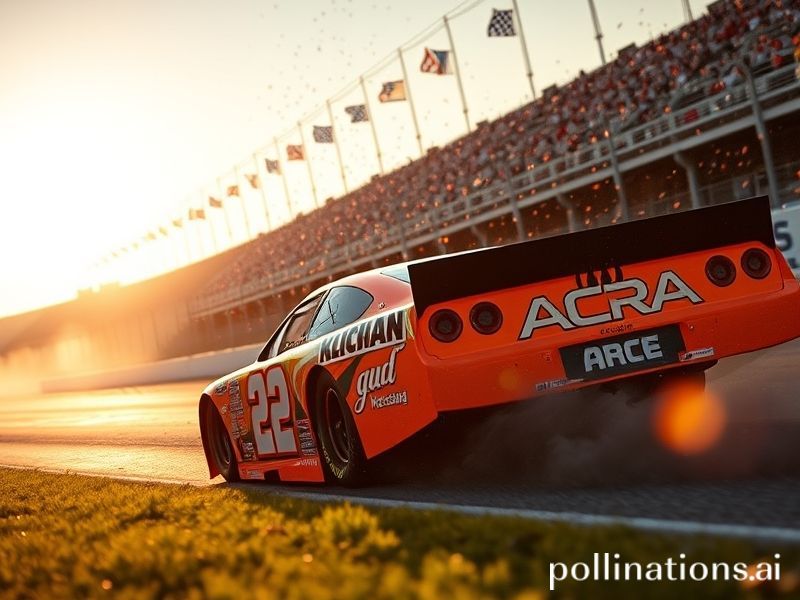ARCA Race Today: High-Octane Distraction in a World Running on Fumes
ARCA Menards Series: Today’s Oval Ballet in the Shadow of a Burning Planet
By Our Man in the Paddock, filing from somewhere with spotty Wi-Fi and existential dread
If you squint past the exhaust haze at Toledo Speedway this afternoon, you can almost pretend the ARCA Menards Series race is the most important thing happening on Earth. Spoiler: it isn’t. But that hasn’t stopped 2,500 horsepower of adolescent ambition and corporate decal colliding at 180 mph while the rest of the planet practices its usual slow-motion immolation. From Kyiv to Kyoto, the same question echoes: “Wait, they’re really running 200 laps of pure Americana today?” Yes, dear reader, and we’re all complicit.
The international significance begins, as most things do, with money. ARCA’s modest TV deal ricochets through the global economy like a drunk tourist’s credit-card bill. Brazilian broadcasters pick up the feed to fill dead air between futebol riots; a Singaporean hedge fund—long on corn futures—keeps one eye on the ethanol-heavy fuel blend because if the Midwest sneezes, Asia’s breakfast gets more expensive. Meanwhile a German supplier of torque wrenches quietly invoices teams whose budgets would barely cover a Bundesliga water boy. The invisible hand of the market is wearing Nomex gloves.
Human capital, too, crosses borders. The polesitter, a 19-year-old whose Instagram bio reads “Jesus & Nitrous,” trained last winter on a simulator coded by Bulgarians who previously calibrated F-16 radar. His spotter is a former RAF cryptographer translating throttle percentages into Cockney rhyming slang, because teams believe British accents sound more trustworthy on the radio. The absurdity is layered like a sponsorship lasagna: an Italian tire company, a Qatari oil brand, and—because irony is now a deductible expense—a Ukrainian cybersecurity firm whose logo flashes past at 0.7 seconds per lap. They’re selling safety; the cars sell speed; we sell ourselves the illusion that any of it is sustainable.
Looming over the grandstands, the geopolitical weather map looks uglier than a restrictor-plate aero package. NATO ministers are holding an emergency Zoom about Belarusian troop movements; the livestream buffers every time someone revs an engine. In Beijing, the Politburo is debating whether to invade Taiwan before or after the next iPhone launch; they pause to watch a clip of last week’s ARCA pile-up, marveling at how democratic societies voluntarily redistribute wealth into guardrail repair. And somewhere in the Persian Gulf, a tanker captain named after a medieval poet wonders if the high-octane cargo in his hold will end up vaporized on lap 47 or shipped back out as bottled water once Ohio’s aquifers finish their encore of spontaneous combustion.
Back on pit road, the crews rehearse choreography that would make a Bolshoi ballerina weep with envy—if ballerinas had to dodge 3,400-pound ballerinas made of sheet metal. The jackman, a part-time philosophy PhD, quotes Camus between lug-nut rotations: “The struggle itself toward the heights is enough to fill a man’s heart.” Then he remembers he’s on a 12-second clock and drops the car like it’s hot. Over the PA, the announcer reminds fans that today’s race is “carbon neutral,” thanks to an offset purchased from a reforestation project in Indonesia that was actually a palm-oil plantation until last Tuesday. The crowd cheers anyway; cognitive dissonance burns cleaner than E15.
By lap 150 the leaders are drafting like co-dependent exes, trading paint and passive-aggressive radio messages. A late caution bunches the field, because chaos is the only reliable revenue stream left. In the casino of life, the house always wins; today the house is wearing a fire suit and a grin. When the checkered flag finally falls, the victor thanks God, his crew, and an energy-drink conglomerate whose stock is shorted by pension funds in Reykjavik. The trophy—a plastic piston mounted on walnut—will spend the next month touring shopping malls from Dayton to Dubai, whispering the great American lie that anyone can make it if they just drive fast enough.
And so the ARCA race ends the way all modern spectacles do: with a staged photo op, a press release touting “record streaming numbers in 14 countries,” and a cleanup crew sweeping confetti into the same landfill that receives last season’s unsold merch. Somewhere, a polar ice shelf calves into the sea. Somewhere else, a child who watched today’s race decides internal combustion is the future. The world keeps spinning—clockwise in the Northern Hemisphere, counterclockwise in the Southern, and entirely off its axis everywhere else. We call it progress; the universe files it under “pending.”







